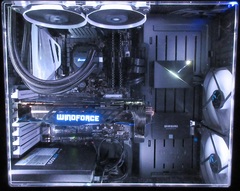Machine Learning: Titan Xp vs 1080ti
Go to solution
Solved by maybethisnamewillwork,
1 hour ago, Zyndo said:Is a 1080ti is fully capable of doing anything a Titan Xp can do, just at a slightly lower level of performance?
Yes, Nvidia has gimped the FP64-performance since the original Titan (GK110), so there's nothing "special". All you really pay is the early adopter tax.
-
Featured Topics
-
Topics
-
DoughmanX_HD ·
Posted in Windows1 -
220VoltsallCore ·
Posted in Operating Systems2 -
Ridoheru ·
Posted in Graphics Cards0 -
0
-
EpicAAron ·
Posted in General Discussion0 -
3
-
Alexis-Ms_Sun21 ·
Posted in Troubleshooting0 -
2
-
Cramig88 ·
Posted in New Builds and Planning14 -
Ghostsanonymous ·
Posted in Displays3
-


.png.255947720031a641abdac78e663b681c.png)
















Create an account or sign in to comment
You need to be a member in order to leave a comment
Create an account
Sign up for a new account in our community. It's easy!
Register a new accountSign in
Already have an account? Sign in here.
Sign In Now